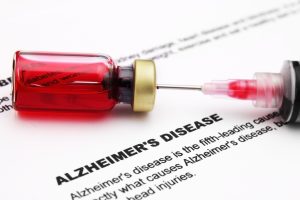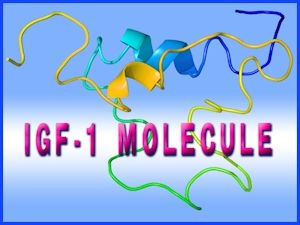In a groundbreaking new clinical trial, three patients suffering from mild to moderate degenerative memory loss - Alzheimer's - experienced a reversal of their misfortune as a result of a new medical regimen.
 Alzheimer's was first outlined around a century ago, although it has surely existed throughout human history. And for one hundred years, scientists and medical professionals attempted without success to find treatments which would benefit Alzheimer's patients, leaving them resigned to neurological degeneration and the meager benefits of palliative care.
Alzheimer's was first outlined around a century ago, although it has surely existed throughout human history. And for one hundred years, scientists and medical professionals attempted without success to find treatments which would benefit Alzheimer's patients, leaving them resigned to neurological degeneration and the meager benefits of palliative care.
Fortunately, a new and revolutionary treatment regimen may be the beginning of a sea-change with regard to Alzheimer's therapy and treatment. In this study, ten participants were provided a comprehensive and personalized regimen with the ultimate goal of reversing their memory loss. In the end, nine out of the ten patients benefited from the treatment, experiencing enhancements in their memory capabilities in the first three to six months of treatment.
Memory Issues Significantly Impacted Patients
Out of the nine patients, six had major issues which made their work difficult, or forced them to quit their jobs. Every one of those six patients was able to either improve the quality of their work or get back in the work force as a result of the benefits provided by their treatment.
This clinical trial is long term, and 2.5 years after the first treatment regimen began, all patients have retained all of the benefits of their memory therapy. Patients in this preliminary study suffered from a few different forms of degenerative memory loss, including Subjective Cognitive Impairment, Amnestic Mild Cognitive Impairment, and Alzheimer's Disease. Although the personalized treatment was successful for patients suffering from the early stages of Alzheimer's disease, the one patient that did not respond effectively to treatment was deep into the progression of Alzheimer's, and was simply too far gone for the treatment to be successful.
How Were Patients Impacted by Memory Loss?
The following are three patient profiles, of the ten patients that were treated:
One patient had been struggling with a deteriorating memory for two years. She was still working, but issues with her memory were getting in the way of her ability to perform her job, which involved data analysis and creating reports. In addition to her issues at work, she was also beginning to have trouble correctly remembering the names of her pets, and she was starting to lose her sense of place and direction while driving.
A second patient was also having issues at work, specifically with regard to his schedule and his coworkers. He would often simply forget the names of the coworkers he spent extensive time with, and he also had trouble remembering the combination to his gym locker.
A third patient had significant memory issues. In order to keep track of her thoughts and her schedule, she had to record everything important into her iPad. Her kids started to notice problems as well. For example, she would often forget what she was saying in the middle of her thoughts, and she would frequently forget to request that her children perform certain tasks, while later on believing that she had done so.
As you can tell, all three of these patients were having major issues in their life because of their degenerating memory.
Comprehensive Therapeutic Approach First of Its Kind
This clinical research trial was the result of the combined efforts of the Buck Institute for Research on Aging and the UCLA Center for Alzheimer's Disease Research. Of all of the studies conducted in the last century regarding Alzheimer's disease, this is the only study thus far that suggests that memory and neurological health can be maintained and improved in at-risk patients through the use of an intensive 36-point therapy regimen that focuses on a variety of aspects of one's life. The following is a short list of the aspects of this comprehensive approach:
- Medications
- Supplements
- Sleep Optimization
- Physical Activity
- Mental Stimulation
- Diet
Using this comprehensive approach, it appears possible to reverse the cognitive decline associated with Alzheimer's in at least some patients.
This study was released in the academic journal, Aging, and the lead researcher of the study is Dr. Dale Bredesen, the Director of the Easton Center and the University of California-Los Angeles. Dr. Bresdon is also an Augustus Rose Professor of Neurology at the University.
The following image is that of an Alzheimer's Patient. Patients with Alzheimer's have smaller brains than healthy patients, the result of deterioration of tissues within the brain.
Drugs Alone Ineffective at Treating Alzheimer's
For decades, researchers have attempted to find a pharmaceutical drug which effectively treats Alzheimer's Disease and its related memory degeneration, to no avail. There are a few drugs that have been found that can mitigate the symptoms very slightly, but no drugs have been effective at changing the course of the disease or even slowing its progression. Over the last ten years, there has been over a billion dollars spent worldwide in an effort to treat Alzheimers, and scores of clinical trials have produced little tangible benefit.
Of course, there are a variety of other chronic conditions which have been treated effectively through the use of combination therapy, but these approaches have not been thoroughly tested in the paradigm of memory disorders such as Alzheimer's disease and dementia. Conditions such as HIV, cancer, and heart disease are not treated particularly effectively by one particular drug, but by a combination or medical approaches including pharmaceutical, nutritional, physical, and/or radiation therapy. By combining approaches, huge strides have been made in the treatment of these conditions. For example, HIV/AIDS, which was practically a death sentence in the 1980s, is simply a chronic condition for many men and women across the country that are able to live perfectly normal lives in spite of having a once life-threatening disease.
As We Learn More About Alzheimer's, Successful Treatments Are Just Around the Corner
The last two generations of Alzheimer's Disease research have changed the way that doctors think about the disease. It is apparent and obvious that genetics plays a central role in the disease, but a variety of other factors are also at play in how Alzheimer's Disease takes place and progresses. Some have even likened Alzheimer's Disease to other chronic and degenerative conditions such as Osteoporosis. As a result of this research, it has become apparent that a broad approach to Alzheimer's is likely necessary to produce real results, as no individual aspect of the ideal treatment will be as potent as the sum of its parts.
Although no “cure” or effective treatment has been previously found with regard to Alzheimer's, that is not to say that strides have not been made in the science of understanding Alzheimer's and similar degenerative neurological diseases. For example, a number of studies have implicated specific different factors which appear to contribute to the incidence and pathology of Alzheimer's, but no single treatment based off of that acquired knowledge has been effective at treating Alzheimer's.
No Single Approach Will Cure Alzheimer's
All science to this point suggests that Alzheimer's disease is brought on by a number of factors, and that, although one form of treatment may be scientifically sound, it may not produce significant benefit unless combined with other approaches which affect other aspects of the condition. It appears that combining treatment options into a synergistic program can provide real results for patients with mild to moderate Alzheimer's disease.
Where previous studies failed, Dr. Bredesen found inspiration for his combination therapeutic approach. He feels that these “silver bullet” Alzheimer's treatment strategies don't take into account the full breadth of the causes of the disease, and that is why they don't benefit the patient sufficiently.
Alzheimer's a Degenerative Disease Related to Lifestyle?
In his clinical research, Dr. Bredesen has discovered significant evidence that the root cause of Alzheimer's Disease is the result of a malfunction in the way that nerve cells interact with one another to form a cohesive memory. In an optimally functioning brain, there are processes which support the maintenance of important memories while also allowing unimportant memories to be forgotten. It appears that some people have brains which malfunction over time, and the brain starts to suppress and delete memories that are important, from where you left your keys to the names of your coworkers or even your family members.
Previous Hypotheses Regarding Alzheimer's May be Incorrect
This goes against the current popular hypotheses regarding the source of Alzheimer's disease. It is commonly hypothesized that amyloid beta peptides are the source of Alzheimer's, believed to be proteins run-amok in the brain, degenerating brain matter, beginning in the areas of the brain associated with memory and cognitive function. Although many researchers believe that these proteins are toxic, they do provide vital functions in the healthy brain. They are proteins that are supposed to promote the deterioration of memories which are unimportant.
Dr. Bredesen hypothesizes that the issue isn't that these Amyloid Beta Peptides are toxic, per se, but because they are normal proteins in the brain that are functioning in overdrive as a result of other underlying factors, which contributes to the degeneration associated with Alzheimer's Disease.
This means that, in essence, Alzheimer's is the result of a collection of factors which cause these proteins to act in a degenerative fashion, and that these proteins specifically are not the root cause of Alzheimer's, but the way that those causes manifest themselves in the brain of the patient.
Alzheimer's Treatment Analogy
Dr. Bredesen uses an analogy to describe how his approach works—Say that you have a roof filled with leaks. Each leak needs to be patched to keep rain out of the house. The roof represents the brain, and each hole in the roof represents a single symptom of Alzheimer's disease. Each Alzheimer's drug has the capacity to patch one of these holes, but simply patching one hole isn't going to secure your roof, and you're still going to be in a heap of trouble. A comprehensive approach to Alzheimer's seeks to use a variety of different approaches in order to patch each individual hole, resulting in a leak-proof roof and a brain in recovery.
Therapeutic Treatment Regimen Designed to Meet the Patient's Needs
The approach that Dr. Bredesen has designed is specific to each patient and his or her needs. Each patient goes under thorough evaluation, in order to figure out exactly what is going on in the patient's brain, and what is leading to the cognitive and memory issues plaguing the patient.
Lets take one patient in particular, a patient that found herself getting lost on her way home from work. The following are the changes made to the patient's life that led to her cognitive recovery:
- A nightly dose of melatonin
- Twenty minutes of meditation, twice each day
- Yoga classes to relieve stress
- Increased consumption of wild-caught fish, fruits, and vegetables
- Elimination of processed food, gluten products, and simple carbohydrates
- CoQ10 supplementation
- Fish oil capsules
- Vitamin D3 Supplementation
- Methylcobalamin Supplementation
- Seven-eight hours of sleep each night
- Daily use of electric toothbrush and electric flosser
- Thirty minutes of exercise at least four times per week
- No food for 12 hours after dinner and before breakfast, and no food three hours before she went to bed
- Reinstatement of Hormone Replacement Therapy, which she had used in the past
All ten patients followed a unique regimen, but each regimen did take cues from the regimen listed above. By following the detailed and personalized program assigned to them, all of the patients but one experienced improved memory, and were able to sustain that improved memory over the course of an extended period of time. The patients are still under treatment, and still being followed to assess the long term effectiveness of the treatment.
Of course, Dr. Bredesen notes, that this study is the first of its kind, and was not fully controlled. In order to more fully assess the effectiveness of the treatment, a future study will be needed with a wider array of patients as well as a more controlled atmosphere. Of course, all signs point to the success of a program such as the one that Dr. Bredesen prescribed to his clinical patients, but the specifics need to be more sufficiently ironed out.
Alzheimer's Treatment Appears Effective, yet Complex
The main issue with this therapy regimen is that it is incredibly complex. Because of how many parameters the patients are supposed to follow, it is inevitable that the patients will have a difficult time sticking to every aspect of the regimen as prescribed. In fact, none of the ten participants were able to follow the therapy regimen perfectly. The two primary issues that the patients and their helpers had with the treatment was that they had to take so many pills each day, and that the lifestyle and nutrition guidelines were a huge change to their normal day-to-day routine.
However, Total Adherence Unnecessary for Alzheimer's Treatment to be Effective
In a way, both the complaints and the inability of the patients to follow their personalized programs to a T, is beneficial to proving the underlying mechanisms of Alzheimer's Disease as described in Dr. Bredesen's hypothesis. That the patients had to undergo a significant lifestyle change showed that their current lifestyle was one that was not conducive to optimal health, both physically or psychologically.
Secondly, the fact that the patients were able to benefit greatly from the treatment without following it strictly provides evidence that Alzheimer's disease is not the result of any single factor, but a collection of factors which contribute to neurodegeneration. By treating multiple factors of that degeneration simultaneously, it is possible to produce real and significant gains in cognitive health and memory capacity, but each factor of treatment plays only a small, synergistic role. Even limited non-compliance specific to each patient still led to results.
Alzheimer's Treatment Benefits both Body and Mind
In addition to providing neurological and psychological benefits, it is also notable that this therapeutic regimen also led to a significant improvement in overall health as well as body composition. Many drugs which are currently used in an attempt to treat and mitigate Alzheimer's actually have negative side-effects which can deteriorate both health and body composition.
Dr. Bredesen is cautious, as any scientist should and must be, but he does admit that the results of the study are incredibly promising. And, given the lack of success with other Alzheimer's protocols, it makes a major statement that this study had a 90% success rate, with the only patient that did not respond being in a significantly poor neurological state.
Future Study Considerations
With the efficacy of the treatment illuminated, there are a variety of other questions that must be answered, and those questions can only be answered with a full-scale clinical trial. The following questions must be answered:
- How deep into cognitive decline can this treatment regimen reverse Alzheimer's Disease?
- Does this treatment regimen produce long-term or life-long results?
- How much improvement can the average patient expect to see from such a treatment?
- Is there a difference in effectiveness dependent upon a patient's family history of Alzheimer's Disease?
As men and women in the United States live longer and longer, preserving neurological health becomes one of the biggest concerns of aging patients. As treatments for cardiovascular disease and heart disease become more advanced and mortality rates from these conditions decline, the next big issue that must be tackled to achieve longevity is treating conditions like Dementia and Alzheimer's which become more common as a patient enters their seventies, eighties, and beyond.
Alzheimer's Is an American and Global Epidemic
Alzheimer's disease is common in America, with almost 5.5 million elderly patients with the disease. Across the world, there are more than thirty million patients with the condition. As populations worldwide continue to live longer and longer, it becomes more and more important to figure out a way to effectively treat or prevent Alzheimer's. In 36 years, it is believed that as many as 13 million Americans will have Alzheimer's disease, a fraction of the 160 million people world wide that will likely experience the condition.
As men and women lose the ability to sufficiently take care of themselves as a result of cognitive degeneration, the societal costs of the condition become significant for a family, and across a society, the scale is astronomical. Finding a way to prevent or cure Alzheimer's is one of the most important areas of study in medicine today. With no cure or effective preventative treatment, the cost of Alzheimer's treatment alone could leave Medicare bankrupt.
Most other chronic health conditions in America have peaked or have fallen in incidence over the years, but Alzheimer's continues to become more common, largely as a result of our extending lifespans and the improved treatment of cancer and heart conditions. Today, Alzheimer's is approximately the third leading cause of mortality in the United States, behind just cancer and cardiovascular disease.
References
https://www.amazon.co.uk/End-Alzheimers-Programme-Cognitive-Dementia/dp/1785041223
Contact Us For A Fast And Professional Response

- Weekly Therapy for Adult Growth Hormone Deficiency Approved by FDA [Last Updated On: January 15th, 2025] [Originally Added On: March 26th, 2021]
- Hormone Replacement Therapy – a Bad Rap? [Last Updated On: January 16th, 2025] [Originally Added On: August 16th, 2021]
- Seven Traits Associated with Good Health and Longevity [Last Updated On: April 24th, 2025] [Originally Added On: September 7th, 2021]
- Why Do I Have Growth Hormone Deficiency? [Last Updated On: January 15th, 2025] [Originally Added On: October 25th, 2021]
- Look Out For Those Hormone Scammers! [Last Updated On: January 19th, 2025] [Originally Added On: April 5th, 2022]
- My Millennial Transformation [Last Updated On: January 20th, 2025] [Originally Added On: June 5th, 2022]
- Running and Getting Nowhere [Last Updated On: January 27th, 2025] [Originally Added On: August 25th, 2022]
- Just Limited Exposure to New Anti-Aging Treatment Has Same Effect as Lifelong Treatments [Last Updated On: January 30th, 2025] [Originally Added On: September 4th, 2022]
- Having a Positive Outlook Can Make Your HGH Therapy Work Better [Last Updated On: December 27th, 2024] [Originally Added On: February 1st, 2023]
- My Friend Told Me to Ignore my Prescription and Double my HGH Intake – Is This a Good Idea? [Last Updated On: December 28th, 2024] [Originally Added On: March 17th, 2023]
- Self-Administering HGH Injections: Messy and Painful [Last Updated On: December 28th, 2024] [Originally Added On: March 23rd, 2023]
- Are You the Fourteenth Man? [Last Updated On: January 1st, 2025] [Originally Added On: March 30th, 2023]
- Should I Get My Hormone Levels Checked? [Last Updated On: December 29th, 2024] [Originally Added On: April 6th, 2023]
- HGH Causes Weight Loss [Last Updated On: January 2nd, 2025] [Originally Added On: April 12th, 2023]
- Will HGH Replacement Therapy Mess up the Balance of my Other Hormones? [Last Updated On: December 29th, 2024] [Originally Added On: April 21st, 2023]
- The Effects of Human Growth Hormone on Men's Confidence and Attractiveness [Last Updated On: January 2nd, 2025] [Originally Added On: April 28th, 2023]
- HGH Case Study: What Terrible Thing Happened to Jeff? [Last Updated On: January 5th, 2025] [Originally Added On: May 4th, 2023]
- The Effect of Radiation on Human Growth Hormone Levels [Last Updated On: February 5th, 2025] [Originally Added On: May 17th, 2023]
- Ibiza Club DJ Thought He’d Never Dance or Make Love Again [Last Updated On: February 5th, 2025] [Originally Added On: May 25th, 2023]
- HGH Deficiency During Childhood [Last Updated On: February 24th, 2025] [Originally Added On: September 22nd, 2023]
- What are the Mental and Psychological Effects of Adult-Onset HGH Deficiency? [Last Updated On: February 25th, 2025] [Originally Added On: September 28th, 2023]
- Potential Mental and Psychological Impacts of Adult-Onset HGH Deficiency [Last Updated On: February 11th, 2025] [Originally Added On: February 11th, 2025]
- Understanding Different Stages of Growth Hormone Deficiency [Last Updated On: February 12th, 2025] [Originally Added On: February 12th, 2025]
- Revolutionary Therapy Regimen Reverses Early Alzheimer’s Symptoms [Last Updated On: March 1st, 2025] [Originally Added On: March 1st, 2025]

















